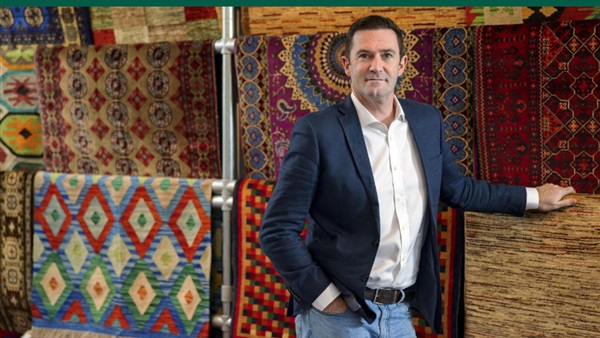‘It is a worrying time in Afghanistan, but weavers are still weaving’

When he first travelled to Afghanistan nearly 20 years ago, James Wilthew was a flight lieutenant in the Royal Air Force. The work involved providing security for reconstruction projects. “We got to go out and about, all across the five northern provinces,” he said.
“We were the eyes and ears for the three- and four-star generals. It was a privileged time to be there. I fell in love with the country and the people.”
He also grew fond of a craft intertwined through Afghan culture for centuries — the art of carpet weaving.
Wilthew now runs the Afghan Rug Shop in Hebden Bridge in West Yorkshire, thought to be the only rug shop outside Afghanistan that sells only Afghan carpets. His carpets are certified “Fairtrade”, which means that the people who make them work in decent conditions and are paid a reasonable wage.
The income generated in the villages and towns where the rugs are produced has become a lifeline during a time of economic and political turmoil.
He is also a corporate sponsor of Afghanaid, one of the charities that will benefit from The Times Christmas appeal.
“They are the longest-standing, most credible aid agency in the country,” he said. “The vast majority of their staff are Afghans. The money goes where it’s needed.”
When Wilthew, 46, first found himself in Afghanistan in 2003 there was no stable internet, no smartphones and no social media to speak of.
Given the fragility of communications, he assumed it was his only chance of acquiring a genuine Afghan rug. “I actually bought 42 of them and bought them back on a Hercules.
“I sold half of them when I got back to help pay for my wedding, and kept hold of the rest for a house which at the time I did not have — a kind of expensive loft insulation.”
Twelve years later, a friend would admire one of those carpets and asked Wilthew whether there was any chance of getting one from the same region.
It took him three months to make an initial set of contacts across the northern provinces. “I was searching Google images online, randomly ringing places in northern Afghanistan,” he said. Three months after that, he was importing his first carpets. The business has now been running for more than seven years, with a portion of the profits going to Afghanaid.
During that time, Afghanistan has been through a seismic change. A Taliban takeover in August last year was a disaster for women and human rights. The situation was compounded by a suspension of foreign aid — which accounted for 75 per cent of the state budget — along with the freezing of the central bank’s dollar reserves.
The result has been a virtual collapse of the banking system and, according to the World Bank, a 30 per cent contraction in the economy. On top of that, the country has been hit by the worst drought in decades, while food and energy inflation have soared as a result of Russia’s invasion of Ukraine.
Through the chaos, the carpet makers have continued to weave. “It is a remarkable process, and it hasn’t changed for hundreds and hundreds of years. It’s very laborious, but it’s a well-respected craft and it pays a middle-class wage,” he said.
For the workers who produce the rugs, the revenues generated by a carpet shop based in Yorkshire — but which has customers in more than a dozen other countries — have been crucial.
“A lot of the weaving goes on in peoples’ homes,” he said. “It is a worrying time in Afghanistan, but weavers are still weaving — because you can safely weave in your home. And as much as I’d rather the Taliban weren’t there, they are. So we just have to work with that as best we can.”





